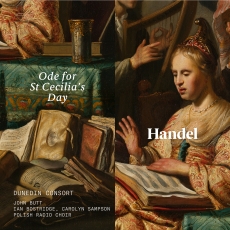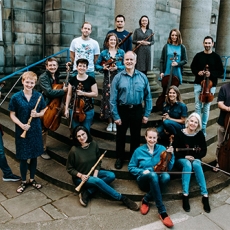Dunedin Consort - Handel: Ode for St Cecilia's Day - Europadisc
Since they first appeared on the early music scene more than two decades ago, the Dunedin Consort under their founder and director John Butt have firmly established their reputation with a landmark series of recordings of Bach’s vocal works that marry fastidious research with outstanding musicianship. But they also have a proven track record in the music of Bach’s great contemporary, Handel, with acclaimed accounts of Messiah, Acis and Galatea and Esther to their credit. To those they now add the 1739 Song for St Cecilia’s Day (better known as the Ode for St Cecilia’s Day), and it’s just as compelling as its predecessors.
Originally programmed alongside the two-part ode Alexander’s Feast for performance on St Cecilia’s Day, 22 November 1739, the St Cecilia Ode is the length of a single act (audiences of the time expected their vocal music served up in three substantial portions). The text, by John Dryden, celebrates the power of music to move human passions, as well as its basis in divine/cosmic science, with St Cecilia herself emerging as the central figure. Scored for soprano, tenor, chorus and a timbrally varied orchestra, it’s an engaging and surprisingly powerful work in the right hands, and Butt and his musicians give it their all.
The eight singers of the Dunedin Consort are reinforced by the twenty members of the excellent Polish Radio Choir, giving the choruses (particularly the exultant closing stanza) plenty of force combined with stylishness and clarity of enunciation. With starring roles for solo cello, trumpet, flute, lute and organ, the Dunedin instrumentalists are at the peak of their form. There’s a pleasing earthiness to the three-movement overture, and the strings are marvellously evocative, whether in the magical chords of the creation scene (‘When Nature underneath a heap’) or in the spiky lines of ‘Sharp violins complain’). Katy Bircher’s flute solo and Paul Sharp’s trumpet illustrate even more powerfully than Dryden’s verses music’s ability to rouse the senses, and the recording balance ensures that the important parts played by lute and organ (the latter representing St Cecilia herself) are heard in every detail.
Of course, the big stars in any performance of the Ode to St Cecilia are the solo soprano and tenor, and here this recording hits gold. Tenor Ian Bostridge draws the listener into the text, and his account of ‘The trumpet’s loud clangour’ is both thrilling and vividly communicative. In the placatory and then revelatory soprano part is one of today’s great Handelians, Carolyn Sampson. With meltingly gorgeous tones, a constant engagement with the text, and matchless phrasing, her performance really sets the seal on this performance, as it builds to its apocalyptically transformative conclusion when ‘music shall untune the sky’.
The other star is Butt himself: as ever, he shapes the music in an unforced, surefooted manner. Just as importantly, the narrative arc – the transition from one movement to the next and the sense of the work’s overall architecture – are never lost sight of, adding enormously to the overall musical experience.
As a coupling, Butt includes the A minor Concerto grosso, no.4 of Handel’s exactly contemporaneous Opus 6 set. Superbly played by the Dunedin instrumentalists, it is yet another absorbing example of music’s ability to engage and move the passions, making it a perfect companion for the Ode itself. Butt’s customarily erudite and detailed notes, and an exceptionally fine recording from Kraków’s Krzysztof Penderecki Hall all add up to make this an unmissable recording. And, with Cecilia-tide fast approaching, what better time to hear it?
Carolyn Sampson’s many admirers should also look out for her soon-to-be-released disc of four of Handel’s brilliant early Italian cantatas, splendidly accompanied by the King’s Consort on the Vivat label. She really is the Handelian of our age!




